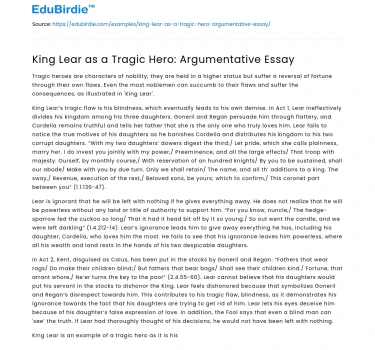Tragic heroes are characters of nobility; they are held in a higher status but suffer a reversal of fortune through their own flaws. Even the most noblemen can succumb to their flaws and suffer the consequences, as illustrated in 'King Lear'.
King Lear’s tragic flaw is his blindness, which eventually leads to his own demise. In Act 1, Lear ineffectively divides his kingdom among his three daughters. Goneril and Regan persuade him through flattery, and Cordelia remains truthful and tells her father that she is the only one who truly loves him. Lear fails to notice the true motives of his daughters as he banishes Cordelia and distributes his kingdom to his two corrupt daughters. “With my two daughters’ dowers digest the third;/ Let pride, which she calls plainness, marry her. I do invest you jointly with my power,/ Preeminence, and all the large effects/ That troop with majesty. Ourself, by monthly course,/ With reservation of an hundred knights/ By you to be sustained, shall our abode/ Make with you by due turn. Only we shall retain/ The name, and all th’ additions to a king. The sway,/ Revenue, execution of the rest,/ Beloved sons, be yours; which to confirm,/ This coronet part between you” (1.1.136-47).
Save your time!
We can take care of your essay
- Proper editing and formatting
- Free revision, title page, and bibliography
- Flexible prices and money-back guarantee
Lear is ignorant that he will be left with nothing if he gives everything away. He does not realize that he will be powerless without any land or title of authority to support him. “For you know, nuncle,/ The hedge-sparrow fed the cuckoo so long/ That it had it head bit off by it so young./ So out went the candle, and we were left darkling” (1.4.212-14). Lear’s ignorance leads him to give away everything he has, including his daughter, Cordelia, who loves him the most. He fails to see that his ignorance leaves him powerless, where all his wealth and land rests in the hands of his two despicable daughters.
In Act 2, Kent, disguised as Caius, has been put in the stocks by Goneril and Regan. “Fathers that wear rags/ Do make their children blind;/ But fathers that bear bags/ Shall see their children kind./ Fortune, that arrant whore,/ Ne’er turns the key to the poor” (2.4.55-60). Lear cannot believe that his daughters would put his servant in the stocks to dishonor the King. Lear feels dishonored because that symbolizes Goneril and Regan’s disrespect towards him. This contributes to his tragic flaw, blindness, as it demonstrates his ignorance towards the fact that his daughters are trying to get rid of him. Lear lets his eyes deceive him because of his daughter’s false expression of love. In addition, the Fool says that even a blind man can 'see’ the truth. If Lear had thoroughly thought of his decisions, he would not have been left with nothing.
King Lear is an example of a tragic hero as it is his tragic flaw, blindness, that leads to his ultimate demise.






 Stuck on your essay?
Stuck on your essay?

